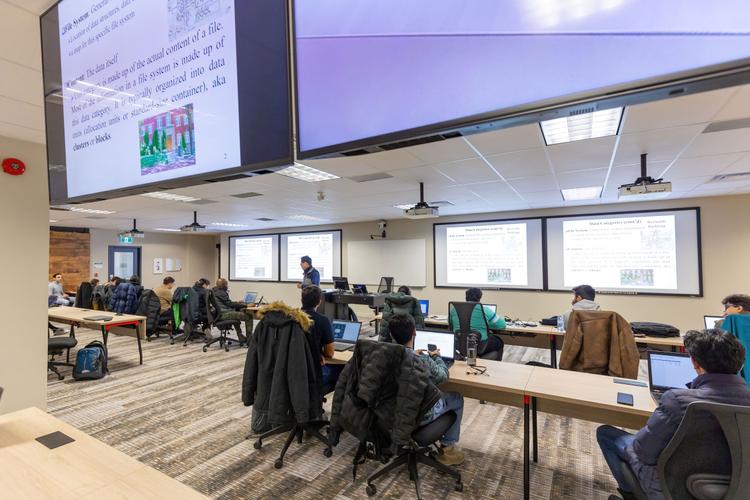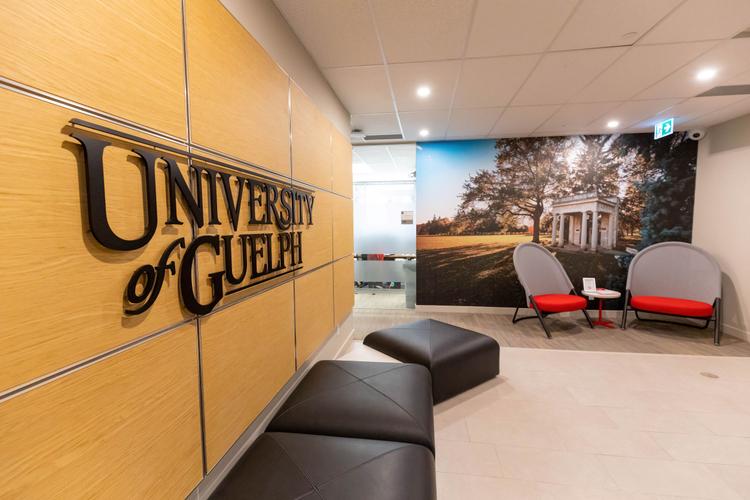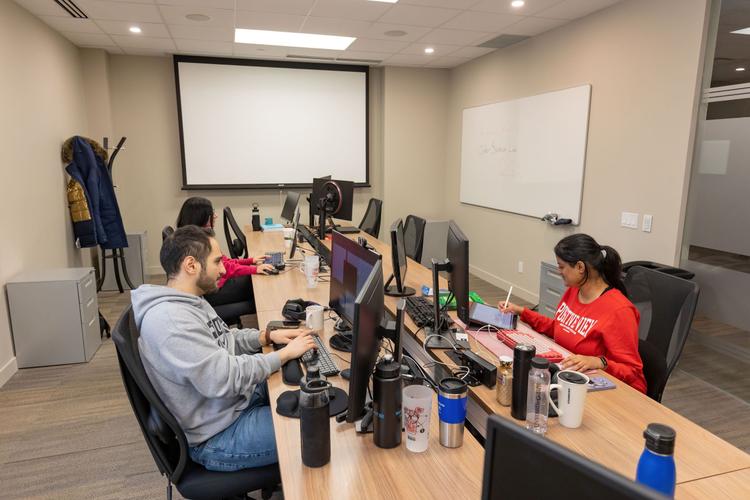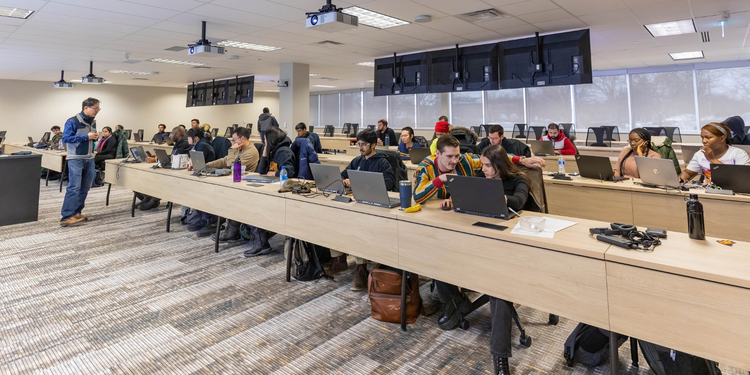
Master of Cybersecurity and Threat Intelligence (MCTI)
Cybersecurity is one of the fastest growing career fields around the world.
As Canada's only ONE-year Master Cybersecurity Program that focuses on Threat Intelligence (MCTI), the University of Guelph will help create the next generation of cybersecurity professionals. Located adjacent to Canada's Technology Triangle (CTT) and only a one hour drive from Toronto, our in-person program strongly connects to local industry and career opportunities. Graduates of the master's program will become leaders in security analysis and design, threat intelligence, penetration testing and malware analytics, cryptography engineering and digital forensics.
Cybersecurity is one of the fastest growing fields around the world. Threats to public safety are evolving at a rapid rate with the expansion of technology, networks and devices in existence and coming to market.
Fill the Talent Gap
Our graduates are equipped to help close the significant gap between skilled cybersecurity professionals and the need for this expertise.
Relevant Topic Areas
Topic areas include: Threat Intelligence, Security Architecture, Cryptography, Public Safety, Digital Forensics, Attacks and Defence. Artificial Intelligence, Privacy.
Part-time and full-time course load
Complete the program in as little as one year, or up to two, providing flexibility for your career pathway in Canada.
Those considering cybersecurity graduate studies might also be interested in U of G's Master of Cybersecurity Leadership and Cyberpreneurship program.
Why a degree in cybersecurity?
MCTI graduates enter exciting careers, growing an area that is advancing research and playing a major role in industry and consumer products around the world. Here are just a few careers our alumni choose to Improve Life:
- Security Architect
- Security Engineers
- Security Analyst
- Penetration Tester
- Forensic Analyst
- System Administrator
- Cybersecurity Consultant
- Vulnerability Analyst

Degree Details
Faculty/College: College of Computational, Mathematical, and Physical Sciences; School of Computer Science
Degree name: Master of Cybersecurity and Threat Intelligence (MCTI)
Delivery method: On-campus
Start dates: Fall, Winter, Summer
Length: 12-24 months
Program load: Part-time, Full-time

State-of-the-art learning environment
The University of Guelph has invested over $4M in a new state-of-the-art research, teaching and cybersecurity innovation facility. The 4,000-square foot facility opened in January 2023. It offers dedicated space to equip our Master's students with practical learning experiences in the classroom and collaborative work spaces.

Gain valuable experience through internships
MCTI students will have the opportunity to apply for prestigious internships with many of our prominent industry partners. Research-oriented students will have the opportunity to work on a cutting edge cybersecurity research project with one of our world-renowned faculty members. Project placements are encouraged, but not guaranteed.
Depending on your cohort, students will complete industry or research projects in either the summer or fall semester.
2026 Guaranteed Admission Pathway (GAP) for U of G Students and Alumni
The Master of Cybersecurity and Threat Intelligence program is proud to offer guaranteed admission to eligible University of Guelph students and alumni.
This pathway reserves a limited number of spots in the program for students who meet the program admission requirements.
If you are accepted:
- The application fee will be reimbursed after you start the program
- You do not need to include references in your application
To find out if you are eligible, apply for the CCMPS Guaranteed Admission Pathway.
Hear from two current students
"There is a deficit of cybersecurity people, and here in Canada, there is a lot of opportunities. All the companies need to have a cybersecurity team and there's no people! So that's why this program is very interesting and it's very important." - Gessuri Garcia
"I have a lot of chances to talk to different C-level individuals in the IT industry, especially in the Toronto area... Technology is changing every day. You need to be very agile and very adaptive and very proactive to learn new stuff. " - Milton Kwan
What you will learn - course outline
Concepts and technical measures that are employed to enforce security policies and protect networks and systems from malicious activities. Students will learn how to engineer a secure system and how to secure networks in an ethical manner.
In-depth understanding of theoretical concepts and practical issues in the field of digital forensics and incident response. Students will develop necessary skills, methodologies, and processes to detect cyber incidents and conduct in-depth computer and network investigation.
In-depth understanding of techniques for detecting, responding to, and defeating Advanced Persistent Threats (APT) and malware campaigns using artificial intelligence and data mining techniques. Students will identify, extract, and leverage intelligence from different types of cyber threat actors.
This course provides an in-depth understanding of techniques for detecting, responding to, and defeating Advanced Persistent Threats (APT) and malware campaigns using artificial intelligence and data mining techniques. Students will identify, extract, and leverage intelligence from different types of cyber threat actors.
This course provides an in-depth view of the privacy, regulatory, and ethical issues surrounding cybersecurity. It covers methods of mitigating/treating privacy risks associated with emerging technologies that collect, manage, and analyze data. This course also examines data protection regulations and compliance strategies.
This course provides an in-depth understanding of modern cryptography, with emphasis on practical applications. Topics covered include classical systems, information theory, symmetrical cryptosystems, block ciphers, stream ciphers, DES, AES, asymmetric cryptosystems, ECC, provable security, key exchange and management, and authentication and digital signatures, among others.
This course provides a comprehensive review of tools, techniques, and procedures for monitoring network events and assets to build a secure network architecture. It trains students in methods for hunting attackers that could bypass designed network defense mechanisms in an enterprise.
This two-semester course offers a multidisciplinary forum for discussion of topics related to cybersecurity. The seminar fosters professional skills development (academic and industry), promotes collaboration between industry experts and graduate students, facilitates mentoring and project development, and contributes to the transfer of knowledge between industry and academia.
This course provides an in-depth view of a variety of advanced topics within cybersecurity. Subject areas discussed in any particular semester will depend upon the interests of both the students and the instructor. Students should check with the School of Computer Science to determine what topics will be offered during specific semesters.

"We're approaching a cyber-security talent shortage of 2 million people worldwide in the next 3 to 5 years. Every cyber-security provider can contribute, and when we're joined by respected education institutions like the University of Guelph, our combined effort makes the world safer."
Christopher D. Young, Former CEO, McAfee
Program Information
Applicants must meet the following minimum admission requirements of both the University of Guelph and the School of Computer Science (SoCS):
- Four-year honours degree: Admission to the MCTI program requires a four-year honours degree in computer science or computer engineering (or related discipline), or a four-year honours degree in another discipline with a minor in computer science or computer engineering (or related discipline).
Entrants who have a four-year honours degree in another discipline and a minor (or equivalent) in computer science must have taken a minimum of 10 computer science-related courses. Applicants with an honours degree in an unrelated discipline who possess proven skills and working experience in cybersecurity may be considered. - Relevant experience: Relevant experience or background knowledge of Data Communication and Networking and Computer Programming is required. Applicants who do not meet the four-year honours degree requirement and would like their relevant work experience considered for admissions must provide at least one industry reference that speaks directly to the applicant's relevant computing and/or technical cybersecurity skills and knowledge.
- A minimum 'B' average: Applicants are required to have a minimum average of 75% (B) during the previous two years of full-time study for an accredited undergraduate university degree. For information on international degree admission requirements, please see: International Credential Evaluation and select country.
English proficiency test: If your declared first language in your application is not English, you will be required to submit the results of a standardized language test with your application. Please see a list of valid English proficiency tests and required minimum scores.
The proof of English proficiency requirement may only be waived if the applicant has conferred a degree in a country where English is the native language AND, in a university, where English is the language of instruction, which includes Canada, USA, UK, Australia, and New Zealand. Graduate Admissions Committee approval is required.
If you are accepted, your admission would be conditional upon the original test results being sent directly to the Office of Graduate & Postdoctoral Studies from the testing centre. The test may not be more than two years old from the start date of the program.
- As the MCTI is a course-based program, a supervisor is NOT required for admission.
Applicants must provide documentation noted on the application page detailing the above, including:
- Academic Transcripts
- A current resume or CV
- Statement of Interest detailing what you are looking to achieve with a graduate degree and what your interests are from a course or project perspective
- Two academic references; professional references are also accepted if you no longer have access to current academic referees, and must be provided from a referee in a supervisory position (references from colleagues will not be accepted)
- A test of English proficiency is required of all applicants whose first language is not English*
*In exceptional circumstances, you may apply to have your test of English proficiency waived. More information can be found under the "Information for International Applicants" tab below, or on the graduate studies webpage. - The GRE is NOT a requirement for admission
Full-time and part-time admission to the MCTI program commence in Fall and Winter semesters.
We will not be able to pre-evaluate any documents, and must receive all the required documentation before your application can be evaluated. If you need further assistance, please contact our Graduate Program Assistant.
Availability is required to attend in-person classes during business hours, after-hours, weekends and off-campus. Use of personal laptop is also required, as per the MCTI Program Laptop Specifications.
Full-time and part-time admission to the MCTI program is available in the Fall, Winter and Summer semesters. The MCTI program is a full-time, one-year, course-based program (3 semesters, or 12 months). Alternatively, a part-time enrolment is typically two years to complete the requirements. Students will complete eight courses covering key topics in the cybersecurity field.
Official Deadlines for Domestic Applicants
- Fall (September) semester: July 31
- Winter (January) semester: November 30
- Summer (May) semester: April 30
Official Deadlines for International Applicants*
- Fall (September) semester: February 28
- Winter (January) semester: June 30
- Summer (May) semester: October 31
*To maximize your chances of obtaining a study permit and being able to make it in time for the respected start term, we strongly encourage International Applicants to visit the OGPS Recommendations for International Applicants for suggested application timeline. Check processing times for your country at IRCC - Canada.ca.
For information on the fee structure for full-time and part-time tuition, please visit Guelph Graduate Fees.
More information on Cost of Living in Guelph can be found here: Cost of Living While Studying at Guelph.
International Applicants
Applications from international students are welcomed.
Do I need to provide an English Language Proficiency Score? A valid English proficiency test is required for applicants whose first language is not English. If your first language is not English but you have completed prior post-secondary studies in a country where English is the main language, then you may request to have your English Language Proficiency requirement waived. You will need to write a brief statement about the University from where you obtained/will be obtaining your degree, then upload this statement in the English score test section of your application. For more information about the English language requirement, acceptable tests, and minimum test scores, please visit the Office of Graduate & Postdoctoral Studies, English Language Proficiency webpage.
Academic Credentials: Please use this International Credentials Guide to compare your academic credentials and determine the grade equivalency needed.
GMAT/GRE: Not required for this program.
WES Reports: Not required for this program.
Timelines and when to apply: All applications must be completed and submitted by the deadline outlined above. Due to varied processing time for international student visas, students are encouraged to apply as early as possible for earliest acceptance. Review the overview of the typical application process for Prospective Students - International Applicants for more information.
Go to the Recommendations for International Applicants for suggested application timeline. All required documentation must be submitted by deadline or your application will be considered incomplete.
*Due to longer processing time for international student visas, students are encouraged to apply early as possible. Please allow 10-12 weeks for response time due to high demand and time required for processing applications.
**Attention International Applicants: Despite Canada's new restrictions (IRCC) on international student visas, our MCTI graduate program remains unaffected. For further information on Canadian study permit policies, please reach out to our International Student Advising Team.
The Master of Cybersecurity and Threat Intelligence at the University of Guelph is a self-funded program. To assist you in your financial planning please consult available Graduate Scholarships and the University's Cost of Living/Tuition guide.
The curriculum for the MCTI program is unique in its core focus on highly desirable and diverse security skills including threat intelligence using artificial intelligence techniques, Security Incident and Event Management (SIEM), intrusion prevention, malware analysis, penetration testing, and computer forensics, and in its integration of experiential lab-based learning.
The innovative curriculum is complemented with experiential learning opportunities developed in support of this proposed program will prepare students for fulfilling and challenging careers in the security field. To keep the curriculum relevant to the industry needs, a Cybersecurity Advisory Committee, consisting of partners from the industry has been formed. These industry partners have also agreed to serve as long-term advisors to the program and they will be responsible for providing feedback on curriculum and other potential areas of program improvement.
In addition to coursework, full-time students will have the option to complete a project with an industry partner that should advance knowledge or practice, and address an emerging challenge in security and privacy.
CIS*6560 [1.00] Cybersecurity and Threat Intelligence Project
Important! You need to bring your own system configured according to these instructions!
MCTI is a very hands-on program and you need to bring a properly configured system. If you do not carefully read and follow these instructions, you will likely not be able to participate in hands-on exercises. Therefore, we strongly urge you to arrive with a system meeting all the requirements specified below. Please back up your system before class. Better yet, do not have any sensitive data stored on the system. We can’t be responsible for your system or data.
- CPU: 64-bit Intel i5/i7 (4th generation+) - x64 bit 2.0+ GHz processor is mandatory for system requirements. Processors from newer generations are highly recommended to ensure adequate performance.
- CRITICAL NOTE: Apple systems using the M processor line cannot perform the necessary virtualization functionality needed in some courses and therefore cannot in any way be used! Similarly, devices with ARM-based CPUs are also not compatible.
- It is critical that your CPU and operating system support 64-bit so that our 64-bit guest virtual machines will run on your laptop. For troubleshooting, this article: How to determine if you have a 32-bit or 64-bit CPU, also provides good instructions for Windows users to determine more about the CPU and OS capabilities.
- BIOS settings must be set to enable virtualization technology, such as "Intel-VT". Be certain you can access your BIOS and make changes to settings as necessary.
- 32 GB (Gigabytes) of RAM or higher is recommended
- USB 3.0 Type-A port is required. At least one open and working USB 3.0 Type-A port is required. Therefore, a Type-C to Type-A adapter may be necessary for newer laptops. Some endpoint protection software prevents the use of USB devices - test your system with a USB drive to ensure you can load the course data.
- 200gb or more of free space on your System Hard Drive. Free Space on Hard Drive is critical to host the VMs we distribute.
- Local Administrator access is required.
- Wi-Fi 802.11 capability is mandatory. You'll need to connect to an in-class Wi-Fi network in some courses.
- Host Operating System: Your system must be running Windows 11 Pro or another version of Windows that supports virtualization with the capability of running VMware virtualization products.
- It is necessary to fully update your host operating system prior to the class to ensure you have the right drivers and patches installed to utilize the latest USB 3.0 devices.
- Download and install 7-Zip (for Windows Hosts). Without this extraction tool, you'll be unable to extract large archives we'll supply to you in class.
- Download and install the latest version of VMware Workstation Pro, which is available for free for educational use, prior to class. If you run into any issues with the installation process, please reach out to us for instructions.
- You must get the versions of the products that have "Pro" in their name. The non-Pro versions of these products (e.g., VMware Workstation Player) are not sufficient because they do not support snapshot functionality, which we will need to use.
- Other virtualization software, such as VirtualBox and Hyper-V, are not appropriate because of compatibility and troubleshooting problems you might encounter during class.
- VMware Workstation Pro on Windows 11 is not compatible with Windows 11 Credential Guard and Device Guard technologies. Please disable these capabilities for the duration of the class, if they're enabled on your system.
The MCTI program is made possible through in-kind investments of upwards of $2 million by industry partners McAfee Canada, Cisco Systems, IBM, BlackBerry, eSentire, and Kaspersky Lab. The experiential learning will leverage open-source and proprietary security software from our industry partners including Cisco Systems, IBM, Kaspersky Lab and McAfee. The experiential learning takes place in in a new state-of-the-art cybersecurity teaching lab, which enables students to work with real and simulated security attacks independently and collaboratively.
Meet our faculty and learn about our MCTI industry partners.
All MCTI classes are held just off campus at our brand new $2 million cyber security office.
The address is 150 Research Ln - Suite 120, Guelph, ON N1G 4T2 - located on main floor.
https://goo.gl/maps/ttENkELQqLMu7p4QA
Contact Us
Program information, including admissions, completion time, course offerings, and other general information can be found on this page.
Please direct all other program inquiries to our MCTI Graduate Admissions Specialist at cyberapps@uoguelph.ca.
Our team is unable to make recommendations about specific application decisions and can only reflect requirements as outlined on this page. We are also unable to give specific feedback based on decisions from the admissions committee. We thank you for the interest in UofG. We do our best to support you through the application process.




